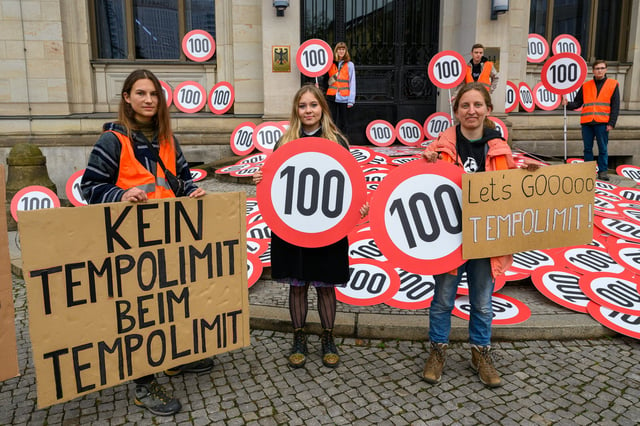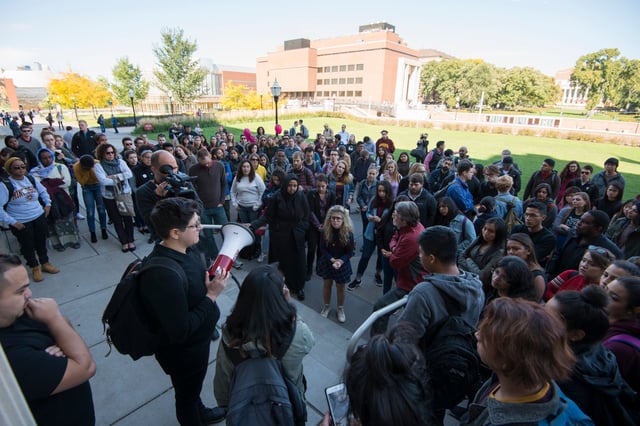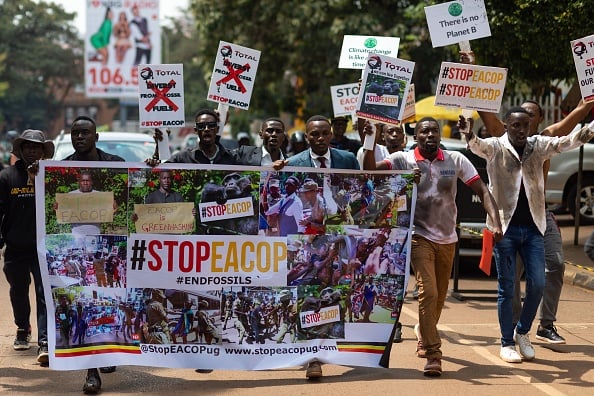
Bob Barigye had mixed feelings the first time he led a small climate protest on the streets of Kampala, Uganda’s capital, in December 2022. He knew he would not escape the police. During the protest, which lasted less than an hour, the four-man group chanted and held placards with anti-East African Crude Oil Pipeline (EACOP) messages, standing along and sometimes in the middle of Kampala Road, in the center of the city.
Just as he expected, he and his fellow protestors, Ivan Kabale, Musoke Hamis, and Semwanga Jackson, were whisked away on a police pickup, interrogated, and detained. Barigye was charged with inciting violence and being a public nuisance.
Six months later, "the magistrate found no merit in the case and dismissed it," Barigye told Drilled. However, it wasn't the last time he would be apprehended. Barigye has since been arrested three more times for protesting against EACOP. An arrest in January 2023 was particularly violent. Police beat Barigye as they arrested him, causing injuries to his arm and leg. Again, the charges were dropped months later.
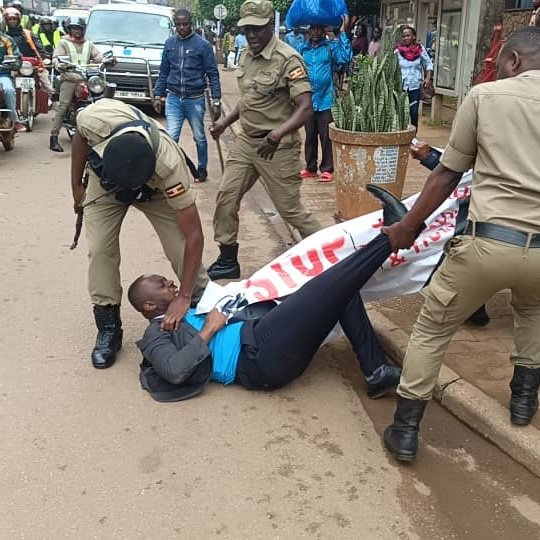
Barigye’s January 2023 arrest.
In response to Barigye’s experience, the United Nations Special Rapporteur on Human Rights Defenders and other UN experts wrote to the government of Uganda in August, expressing concern. “Some 30 human rights defenders and 20 non-governmental organisations that work with communities affected by the EACOP project have been reportedly subjected to surveillance, smear campaigns and threats,” they said.
“These acts seem to be part of a broader pattern of intimidation and harassment of civil society organisations and groups in Uganda who have raised human rights concerns arising from oil and gas projects, which may include the potential displacement of more than 100,000 people without guarantees of proper compensation,” the UN officials added.
Ugandan protestors, primarily youth and students, have been taking to the streets of Kampala to denounce the EACOP for what they view as environmental destruction and human rights violations. Although the climate protests have been non-violent and usually relatively small — ranging in size from four people to a dozen or more — they have been met by brutal crackdowns from the police, who sometimes use teargas, pepper spray, and beatings to suppress protestors and maintain public order. At times, law enforcement officers have arrested and detained protesters, but several of these cases later failed in court or were dropped.
Barigye, a 35-year-old biology and chemistry teacher, was raised in Hoima, the oil district in Uganda's Albertine region where the EACOP pipeline begins. His love for conservation of biodiversity stems from his "special attachment" to his home district, which is a biodiversity hotspot. He sees himself as a climate change activist, part of a global movement calling for the phasing out of fossil fuels and investment in renewable energy. "We hit the streets because we know this makes more impact," he said. He plans to keep protesting until "EACOP can't continue because fossil fuels are outdated."
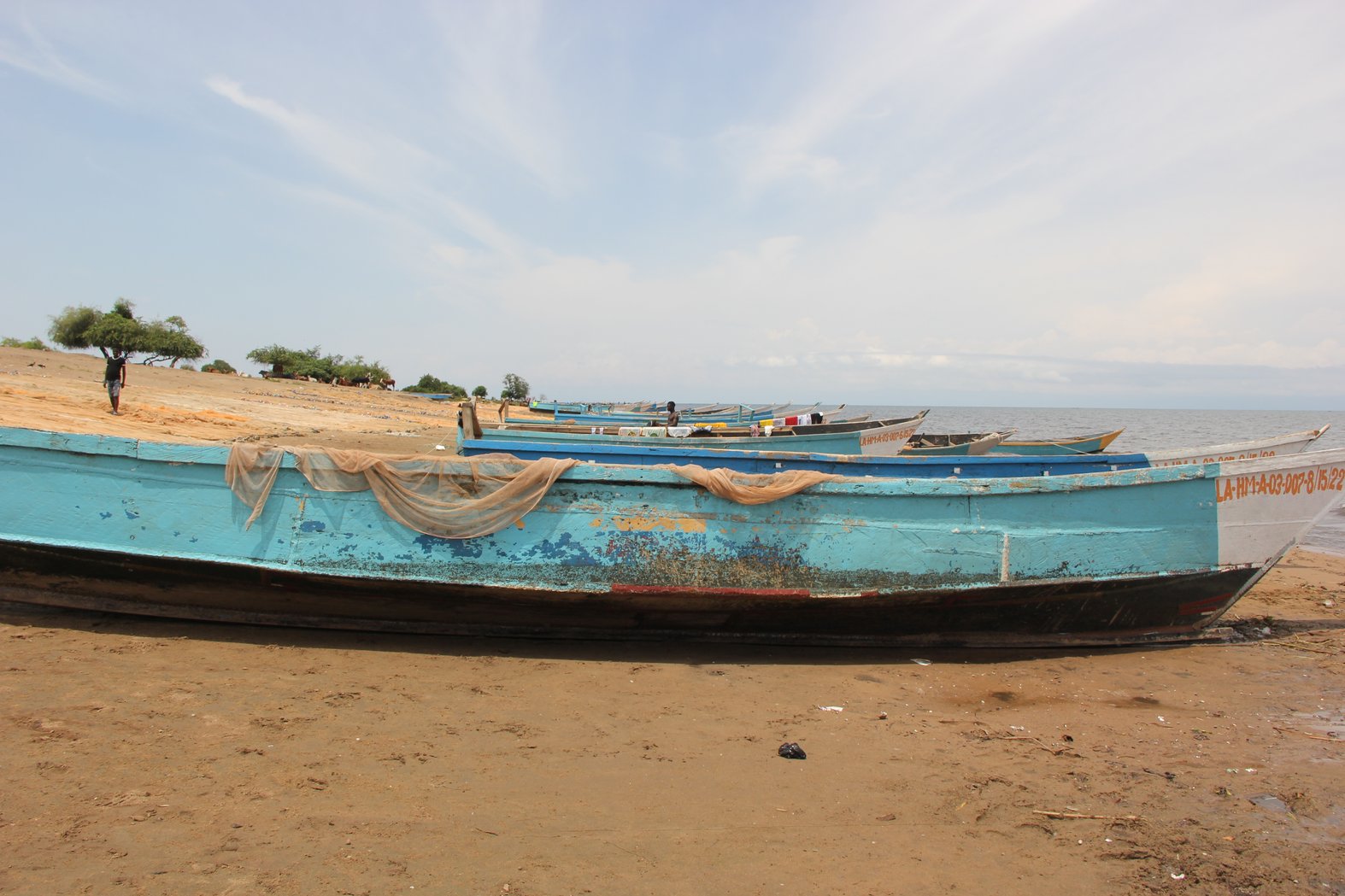
Boats on Lake Albert, a lake believed to be at risk due to oil exploration and transportation in Uganda.
"Protesting in Uganda is not easy," said Diana Nabiruma, Senior Communications Officer at the Africa Institute for Energy Governance (AFIEGO), which works to stop the expansion of the fossil fuel industry in the African Great Lakes region. "You must prepare yourself for being arrested, detained, or injured."
Wetlands, Mangroves, and the Climate at Risk
Amidst the repression of environmental protesters, all parts of Uganda have experienced effects of climate change: landslides in the eastern part of the country, drought in the northeast, floods in Kampala, hailstorms in various regions, and failed crops due to delayed and reduced rains. With EACOP in place, protestors believe such effects are likely to worsen in the near future.
The proposed 1,443-kilometer pipeline will transport oil from Hoima in Uganda through northern Tanzania to the port of Tanga, on the Indian Ocean coast. It is being developed by the French oil company TotalEnergies and the China-based China National Offshore Oil Corporation (CNOOC) in collaboration with the governments of Uganda and Tanzania.
Environmental activists also worry about the impact of spills and emissions on several wildlife habitats, including the river Kagera, a lifeline for millions of people in Rwanda, Tanzania and Uganda, as well as mangroves and coral reefs off the Indian coast where the pipeline ends.
The project opponents argue that the environmental impacts of EACOP contradict international agreements Uganda and Tanzania signed to conserve and sustainably engage with the environment, including the Ramsar Convention, on conservation of wetlands of international importance, the convention on biological diversity, and the 2015 Paris Agreement, on reducing greenhouse gas emissions.
However, the Ugandan government and other proponents of EACOP argue that Total and its government partners have conducted all the necessary impact assessments and are taking every step necessary to protect the environment. Gloria Sebikari, the corporate affairs and public relations manager at the Petroleum Authority of Uganda, the government agency that regulates oil and gas, says the protesters are misguided. She insists that Uganda's oil projects have been designed to generate the "technologically lowest possible carbon footprint." But scientists and climate protesters say there is no such thing as a "low emission" oil pipeline.
Like many other proponents of fossil fuel development in Africa, the pipeline's supporters also argue that the pipeline is necessary for economic development and to address energy poverty, or lack of regular access to energy, in the country. However, much of the oil and gas extracted in Africa is exported to other continents, and there is little data supporting the correlation between extracting fossil fuels and improving energy access. Nigeria, for example, the continent's oldest and largest oil-producing country has the lowest access to electricity globally today, with nearly one in two Nigerians lacking access to power.
Losing Land and Livelihoods
Land acquisition without fair compensation for local communities is another contentious issue surrounding the EACOP. Those relocated to make way for the pipeline include subsistence farmers who have lived on this land for generations, who will now have the crude oil pipeline run through their crop gardens and farms, the sole providers of food and income for education of their children. Up to 13,305 households in Uganda and Tanzania stand to lose some or all of their land for the construction of the EACOP. And a similar story has been unfolding in Uganda as in Mozambique, home to TotalEnergies’ other major fossil fuel development on the continent, with displaced families claiming that they have been forced off their land, poorly compensated, and moved to places that make it hard to make a living or feed their families.
According to Sebikari, no one has been "evicted" without proper compensation, and in Uganda over 85% have received compensated.
However, many of the people with land impacted by the EACOP feel they received too low of a compensation rate, said Benon Tusingwire, the executive director of the Navigators of Development Association, or NAVODA, a nonprofit human rights organization that focuses on environmental issues in the area where oil exploration occurs.
Tusingwire says the low rates have hurt livelihoods. Some families could not buy enough land to replace what they lost. After losing gardens and plantations that used to be a source of income, some could not afford to send their children to school. Others have been unable to produce enough food for their families on the newly acquired land. Families interviewed by Human Rights Watch said they felt pressured to accept cash settlements, and some said they didn’t understand the terms of the agreements they signed.
Such problems are not limited to the EACOP. The pipeline is designed to transport oil from the Tilenga oilfield, which is also co-owned by TotalEnergies. An investigation by journalist Diana Taremwa Karakire revealed that Tilenga oil exploration is causing significant harms for a local Indigenous tribe.
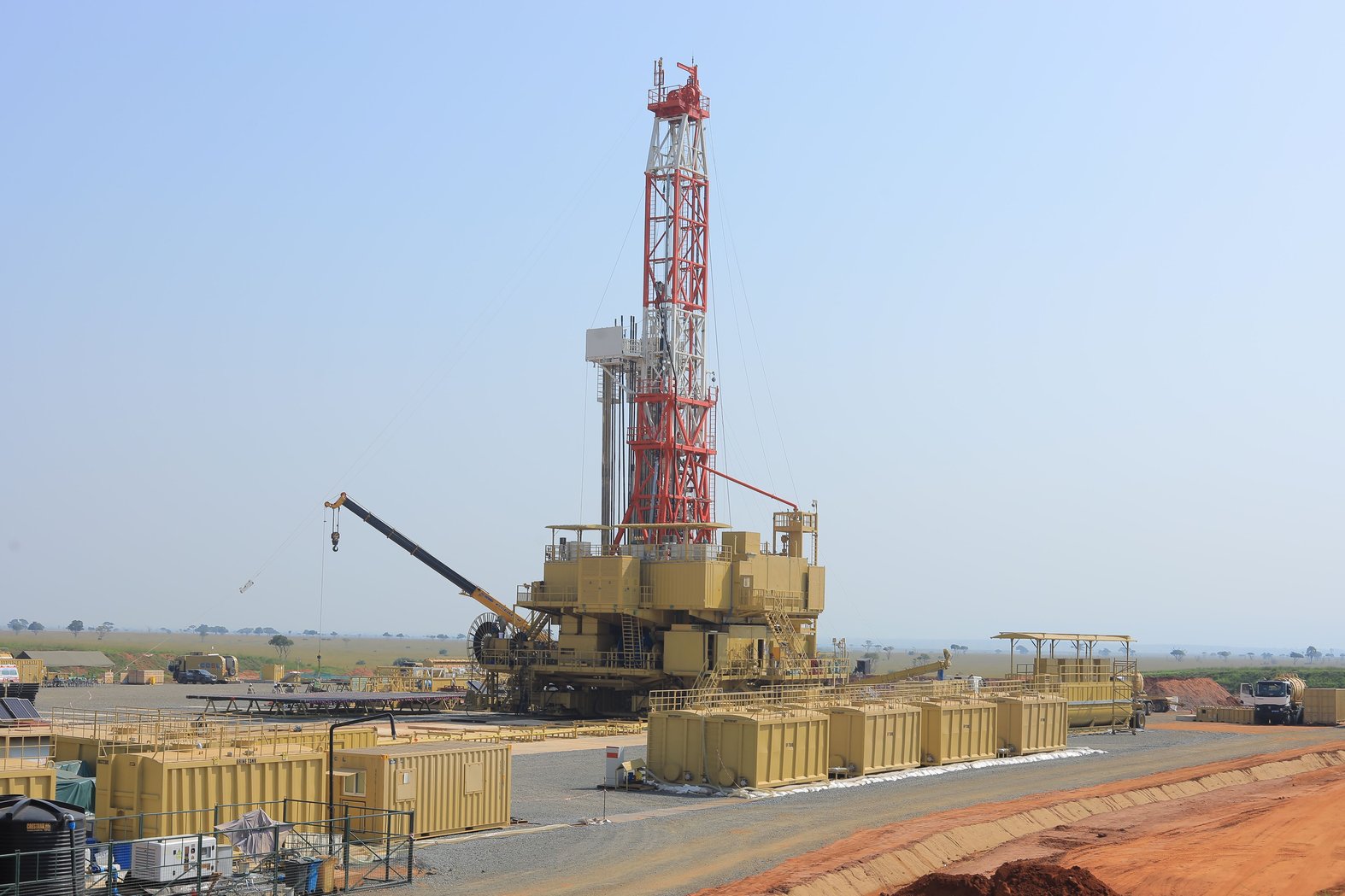
The Tilenga oil rig located in Murchison falls national park, in Western Uganda.
"The project has had various impacts on the Bagungu, including abuse of human, cultural, and environmental rights," she notes. She found that compulsory land acquisition for the project led to the razing of Bagungu cultural sites and loss of communal grazing lands. "There are several complaints about inadequate and delayed compensation, limited involvement and participation in land acquisition processes," she says.
In total, more than 118,000 people live in households that are expected to lose land because of the EACOP and associated development of oilfields like the Talenga.
Arrests without Charges
Barigye is not the only Ugandan climate activist who feels their right to protest has been curtailed by police actions. Shadrach Nirere, the founder of End Plastic Pollution, a youth movement demanding greater corporate action and responsibility to end single-use plastic pollution, has been arrested twice for participating in climate protests in Kampala.
In September 2020, Nirere, born in Kiboga, an agricultural district in central Uganda, was detained by police in Uganda while leading a peaceful climate change protest that attracted 20 youth and students in the Gaba neighborhood of Kampala City. Held as part of the global climate strike week, they demanded the government of Uganda take action against climate change.
"Police came out of their cars, lined us up one by one, and confiscated all the placards we had," Nirere says. Nirere and all the other protestors were taken to Gaba police station, questioned for over two hours, and later released. Police also never charged Nirere after arresting him in Gaba, with dozens of youth waving placards bearing messages including "#Stop EACOP."
Nabiruma, the senior communications officer at AFIEGO, says most arrests of protestors in Uganda end this way. "Because the state often lacks evidence of the charges that they slap against the protesters, they are not charged in court when they are arrested," notes Nabiruma, adding, "When they are charged, we have seen cases being withdrawn from the court or failing in court because the state cannot give sufficient evidence to ensure the conviction of the protesters."
The experience of environmental journalists Venix Watebawa and Joshua Mutale of Water and Environment Media Network (WEMNET), provides a window into why police would arrest those critical of polluting industries without charges. Police in Hoima arrested the reporters in September 2020 after linking them to a planned demonstration against the destruction of Bugoma forest for sugarcane growing.
Law enforcement classified their detainment as "preventative arrest," saying the journalists had planned to participate in a radio program calling on people to protest against the Bugoma forest takeover. The duo spent two nights in jail in Hoima with six environmental and climate activists. They were later released on police bond.
Ugandan Science journalist Gerald Tenywa, who has covered environmental protests for decades, says that it has been hard to cover (EACOP) protestors because the "government is a bit intolerant to protests," emphasizing that "oil and politics are almost fused for developing countries."
Not all climate protesters are so lucky, though. In 2023, eleven university students who were arrested during #StopEACOP protests in Kampala were held in maximum security prison for weeks, and then charged. Those activists go on trial on February 7, 2024 and face up to a year in prison.
Efforts to talk to TotalEnergies in Uganda were futile. The request for an interview was received but has yet to be granted. However, the French multinational energy and petroleum company indicates in one of its online publications that it "will not tolerate any threat or attack against those who peacefully defend and promote human rights" in Uganda.
Is the law the problem or law enforcers?
Critics argue that Uganda’s laws regulating public meetings bolster law enforcement efforts to repress protests.
Kiiza Eron, the CEO of the Environment Shield, an environmental watchdog NGO, points to the Public Order Management Act, passed in November 2013. He says it “stifles opposition rallies."
The most objectionable section of the Public Order Management Act — Section eight, which gave police unrestricted powers to stop and disperse protests — was nullified by Uganda's constitutional court in February 2020. However, the law still requires organizers of protests or rallies to give at least three days' notice to the Inspector General of Police (IGP) through area police commanders. The IGP reserves the right to permit or prohibit protests. Protesters accuse police of using this excuse to "deliberately sabotage their protests."
The two times Nirere was arrested, the organizers of the protests sought permission from police. However, the police never replied. "Even if you formally request permission, it is not a guarantee that they will notify you in time," Nirere says. "That is why it is easy for them to block, restrict, and disperse our protests."
Lawyer Kiiza Eron believes the problem isn't the law on public protest but that "law enforcers use all means at their disposal to arrest environmental protestors." According to Eron, Uganda's law enforcement is "bent on finding an excuse on any law anywhere to limit public protests."
But Kampala Metropolitan Police spokesperson Patrick Onyango says most climate change protestors in Kampala do not respect the law. “We advise them to seek permission, but they do not want to listen,” he contends.
“EACOP protestors are funded by politicians who are in the opposition,” further maintains Onyango, narrating that they “are not environmentalists, but rather, “just politicians who are hired, and “students who do not know even what environment is all about.”
Similarly, former Uganda's deputy police spokesperson Polly Namaye claimed that most climate protestors do not follow the law and never seek permission, while others apply for approval when it is too late.
"What we would want them to do, and which would help all of us, is to treat police as partners. Let them do their part by letting us know in time that they want to carry out a protest," Namaye said.
She underlined that "lawful" protests require an array of permissions. "If it is a public area, have you got permission from the leaders of that place? If, for example, it is a hotel or an assembly ground, have you paid bills to use such a place?" She says "unlawful" protests tend to be disruptive to people, businesses, and transport, so police block them to maintain public order.
Crispin Kaheru, commissioner of the Uganda Human Rights Commission, stresses that it is crucial to have a balance between "maintaining public order and respecting the rights of peaceful protesters," such as environmental defenders. He said law enforcement agencies should be held accountable for violating protesters' rights.
Uganda alleges “selective persecution”
Supporters of the pipeline project say that project opponents seek to slow down Uganda's development, arguing that Ugandan climate protesters should focus their attentions on fossil fuel projects in wealthier countries instead.
Dr Allawi Semanda, the founder and director of Development Watch Centre, a think tank based in Uganda, cites the example of the UK government, saying it is opening a new coal mine in northeastern England, and protestors are not doing much to stop it.
Similarly, Sebikari, of the Petroleum Authority of Uganda, says internationally and locally organized protests against EACOP are "clearly meant to curtail the development of Uganda." She points toward countries like the United States, Russia, Canada, and China, and questions why international campaigners "are not telling the countries with the longest network of pipelines to decommission them."
But there have been many climate protests in the UK, including against coal. And thousands of activists in the United States and Canada have protested against oil and gas pipelines in those countries as well.
At the same time that movement critics direct Ugandan climate activists to focus abroad, they also rely on a trope that has been applied to protesters around the globe: the idea that the organizers are not actually from the impacted area.
Semanda claims that Ugandan climate activists are urban dwellers, lacking "firsthand information" about the "progress" of the rural-based, far-to-reach oil projects and "rely on false information" to protest. "They are just on the streets of Kampala. None of them has bothered to go on the ground," stresses Semanda.
Leaders of the protests say they have been to most of the oil-producing districts, and some work with organizations that operate in this region. Many hail from these regions themselves. Barigye, for example, was born in Hoima, where the EACOP begins.
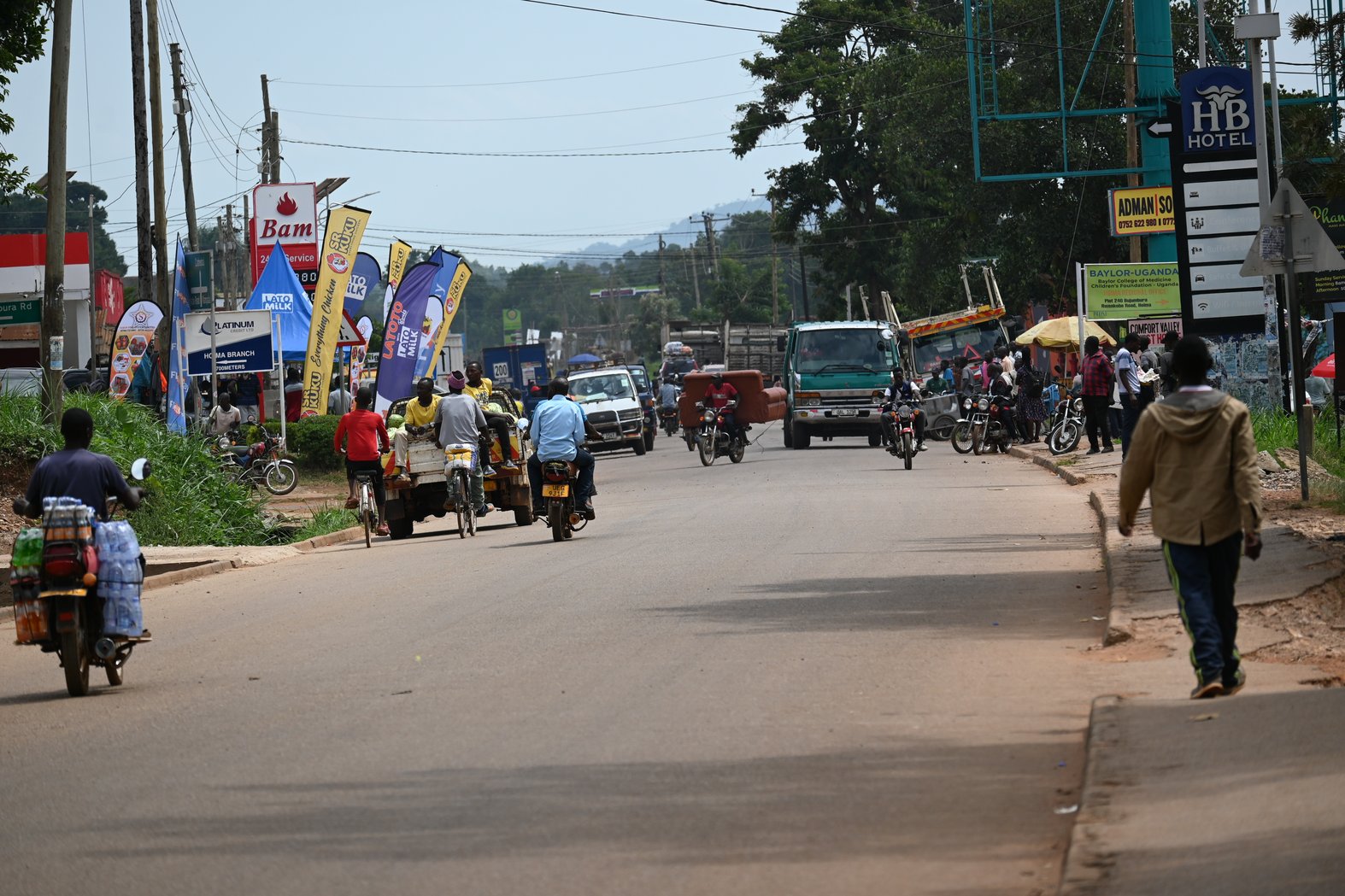
A street in Uganda's oil city of Hoima, where Barigye Bob, climate change activist, grew up.
It's true, though, that the anti-EACOP movement has grown beyond Uganda and Tanzania. #StopEACOP protests have been held across the globe. Zaki Mamdoo, the #StopEACOP Campaign Coordinator, says the protests have helped to ensure that EACOP does not reach financial close to date. "27 major commercial banks and 24 insurers and reinsurers" have pulled out or publicly committed that they will not support EACOP, notes Mamdoo. He also cites a resolution passed by the European Union last year recognizing the threats posed by EACOP to climate and human rights in Uganda and Tanzania.
Barigye laments that in Uganda, climate protestors are still considered "people who don't love development, being used by the West." However, he's happy that the movement's successes are proving that story wrong. "On the contrary, we are just whistleblowers," he says.
